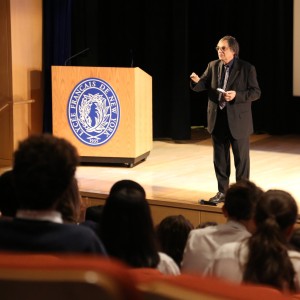A former colleague and lifelong principal whom I hold in the highest esteem often used to say, and in so doing make her students, parents and fellow educators laugh, that middle school is a special period in the educational trajectory of any child because he or she is as cute as can be at the start of it and as scary as can be by the end of it. Of course, she was joking and her humor was full of unconditional affection for the young people to whom she passionately devoted her career. Through her choice of words, however, she was also conveying an important message about adolescence: its rites of passage are metamorphic, to say the least!
Joyful laughter
Listening to the renowned child psychiatrist Marcel Rufo interact with a rapt audience of LFNY parents and faculty in our Cultural Center auditorium last December, it was this pithy insight which first came to mind. After all, the event had been entitled “Crises de parents, crises d’ados” and the Larousse Dictionary defines the word “crisis” as “un moment très difficile dans la vie de quelqu’un.” Yet the room was repeatedly filled with laughter, not the nervous laughter of people faced with a daunting challenge, but the joyful laughter of people realizing that they are all engaged in the same labor of love, one whose fruits are extraordinary: raising children.
As Professor Rufo explained, no matter how good a young person in his or her teens may feel about himself or herself, a key responsibility for anyone involved in the education of adolescents is understanding and accepting that the physiological and related changes which teenagers experience mean that their excitement about life and their idealism about the world will always be mixed with a degree of self-doubt and a need for self-esteem. For parents and teachers, Marcel Rufo affirmed, our roles are straightforward: to be in “alliance” with each other as “supporters” of the young people in our care, building in unison the confidence which adolescents require as they grapple with that eternal question of developing their own individuality, while at the same time contending with the adaptations which society entails. “Comment être singulier et conforme aux autres?” in the words of our acclaimed guest.
How to become oneself despite the pressures of one’s surroundings
It is definitely this dimension of the human adventure which our wonderful ninth and tenth graders have on their minds, as was evident from the highly thoughtful and enthusiastic queries they posed to Professor Rufo in the special two-hour session we organized for them this past December too. Immediately at ease with our visiting child psychiatrist, whose powers of communication were remarkable to behold, our students asked questions about all aspects of life, with one strikingly recurrent theme: how to become oneself despite the pressures of one’s surroundings. “Comment réussir à ne pas avoir peur de soi?” was one brave reflection. “Comment surmonter l’image que les autres ont de nous?” was another.
There is no generalizable answer to such marvellous questions, but Marcel Rufo did make one point abundantly clear: they are entirely natural and innately positive, both for adolescents to express and explore and for parents and educators to hear and encourage. As one of our Seconde students shared as we exited the auditorium together, I REALLY liked meeting Marcel Rufo, Mr. Lynch. We work really hard, as you know, he said with a smile. And we REALLY appreciate that school is aware of everything else we are going through as well. Thank you very much, I replied, adding: when you have a chance, please tell Madame Richard, Madame Anton and Madame Stafford. They made it all happen.*
*Respectively Directors of the Cultural Center, Academic Enrichment and Specialized Support at the LFNY.
About the Author :
Sean Lynch was Head of School at the Lycée Français de New York from 2011 to 2018, after having spent 15 years at another French bilingual school outside of Paris: the Lycée International de St. Germain-en-Laye. Holding both French and American nationalities, educated in France (Sciences Po Paris) and the United States (Yale), and as the proud husband of a French-American spouse and father of two French-American daughters, Sean Lynch has spent his entire professional and personal life at the junction between the languages, cultures and educational systems of France and the United States. In addition to being passionate about education, he loves everything related to the mountains, particularly the Parc National du Mercantour.


